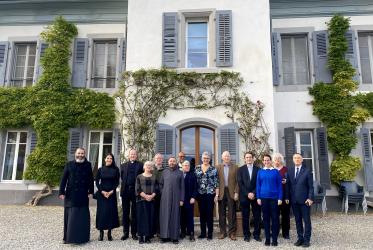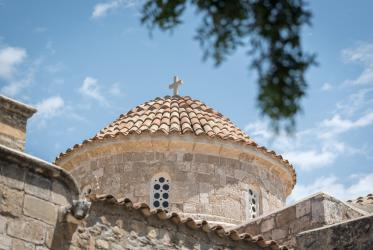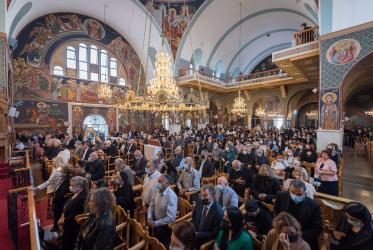Section Report on Unity, New Delhi, India, 1961
This statement arises out of the New Delhi Assembly, at which nearly all the Orthodox churches became members of the WCC. It sets out the Orthodox ecclesiological self-understanding, as well as the concepts of "ecumenism in time" and "ecumenism in space", and their implications for the pursuit of church unity.
Representatives of the Orthodox Church in the Section on Unity welcome the Report of the Faith and Order Commission adopted at St Andrews, Scotland, in August, 1960, as an important and stimulating ecumenical document. The ecumenical movement, as is now embodied in the World Council of Churches, has begun by Protestant initiative, but was not meant, from the very beginning, to be a Protestant endeavour, nor should it be regarded as such. This must be especially emphasized now, when almost all churches of the Orthodox Communion have entered the membership of the World Council. In this situation the Orthodox Representatives feel themselves obliged to underline the basic difference between their own approach to the ecumenical problem and that which is implied in the document of St Andrews. The ecumenical problem, as it is understood in the current ecumenical movement, is primarily a problem of the Protestant world. The main question, in this setting, is that of "Denominationalism". Accordingly, the problem of Christian unity, or of Christian Reunion, is usually regarded in terms of an interdenominational agreement or Reconciliation. In the Protestant universe of discourse such approach is quite natural. But for the Orthodox it is uncongenial. For the Orthodox the basic ecumenical problem is that of schism. The Orthodox cannot accept the idea of a "parity of denomination" and cannot visualize Christian Reunion just as an interdenominational adjustment. The unity has been broken and must be recovered. The Orthodox Church is not a confession, one of many, one among the many. For the Orthodox, the Orthodox Church is just the Church. The Orthodox Church is aware and conscious of the identity of her inner structure and of her teaching with the Apostolic message (kerygma) and the tradition of the ancient undivided Church. She finds herself in an unbroken and continuous succession of sacramental ministry, sacramental life, and faith. Indeed, for the Orthodox the apostolic succession of episcopacy and sacramental priesthood is an essential and constitutive, and therefore obligatory element of the Church's very existence. The Orthodox Church, by her inner conviction and consciousness, has a special and exceptional position in the divided Christendom, as the bearer of, and the witness to, the tradition of the ancient undivided Church, from which all existing denominations stem, by the way of reduction and separation. From the Orthodox point of view, the current ecumenical endeavour can be characterized as "ecumenism in space", aiming at agreement between various denominations, as they exist at present. This endeavour is, from the Orthodox point of view, quite inadequate and incomplete.
The common ground, or rather the common background of existing denominations, can be found, and must be sought, in the past in their common history, in that common ancient and apostolic tradition, from which all of them derive their existence. This kind of ecumenical endeavour can be properly denoted as "ecumenism in time". The report of Faith and Order itself mentions "agreement (in faith) with all ages" as one of the normative prerequisites of unity. Orthodox theologians suggest this new method of ecumenical inquiry, and this new criterion of ecumenical evaluation, as a kingly rock, with the hope that unity may be recovered by the divided denominations by their return to their common past. By this way divergent denominations may meet each other on the unity of common tradition. The Orthodox Church is willing to participate in this common work as the witness which had preserved continuously the deposit of apostolic faith and tradition. No static restoration of old forms is anticipated, but rather a dynamic recovery of perennial ethos, which only can secure the true agreement "of all ages". Nor should there be a rigid uniformity, since the same faith, mysterious in its essence and unfathomable adequately in the formulas of human reason, can be expressed accurately in different manners. The immediate objective of the ecumenical search is, according to the Orthodox understanding, a reintegration of Christian mind, a recovery of apostolic tradition, a fullness of Christian vision and belief, in agreement with all ages.



